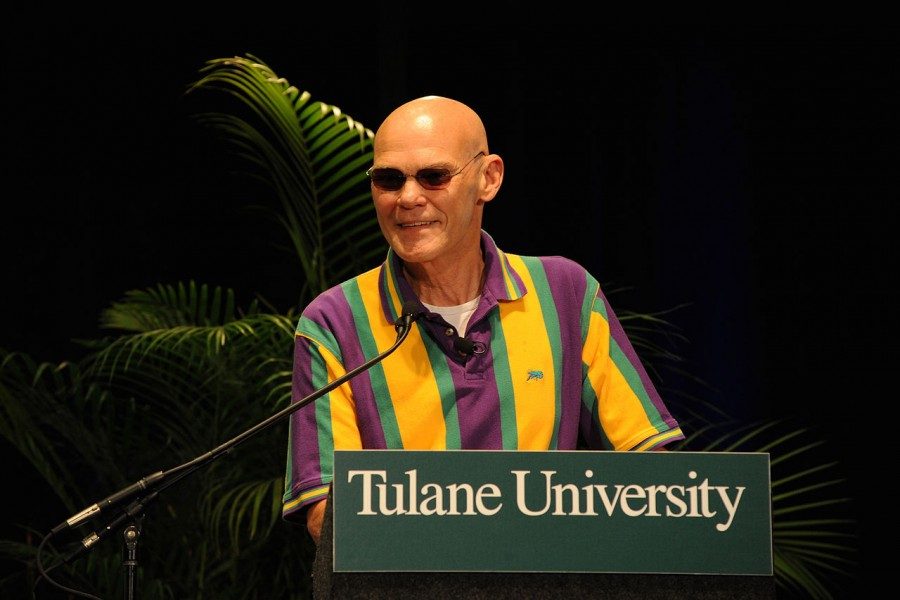James Carville leaves Tulane, brings expertise to LSU
Courtesy of Tulane Public Relations
James Carville speaks at Tulane in 2010 during the Bipartisan Policy Conference. The strategist has worked at Tulane since 2006.
James Carville likes to go to where the problems are.
The legendary political strategist, who has taught at Tulane for the last nine years, will be departing in the spring to join the Louisiana State University faculty.
“We came to Tulane soon after the events of 2005, and it was, you know, it was a place trying to get on the move, it’s a place that really moved, and it’s established itself very very well,” Carville said, “Where LSU has been through horrific budget cuts, and you know, it’s had a tough time.”
Last November, LSU lost $18 million in state support, according to a NOLA.com article. From 2007-15, Louisiana cut funding more than every other state in the country.
Carville is an LSU alumnus, born in Carville, LA, about 16 miles outside of Baton Rouge. He will be joining the Manship School of Mass Communication with plans to teach a class on contemporary American politics in the fall and Louisiana environmental concerns in the spring.
James Carville returns to LSU as journalism school professor https://t.co/rfWiDkJCP2
— NOLA.com (@NOLAnews) September 27, 2017
The famous Louisianan, nicknamed the Ragin’ Cajun, led Bill Clinton’s presidential campaign, as well as a number of other successful political campaigns around the world.
Jett Trudeau, a Louisiana native, is currently enrolled in Carville’s American politics class and said he feels bittersweet about his departure.
“I’m sad that Tulane is losing one of the better American political strategists of our time,” Trudeau said. “Yet simultaneously I think it’s great that LSU is going to get him … there are a lot of students in this state, the state that I’m from, that don’t necessarily get some of the things that Tulane students get, which is large resources, lots of money, lots of esteemed lecturers, etc.”
In his mission to better the institutions he works at, Carville tries to expand students’ world views. He does this by exposing them to new perspectives, taking trips outside of the Tulane community and bringing in outside speakers. Carville has said, “It’s not my job to make students comfortable, it’s really not what I’m there for.”
His current cohort will visit the marshes of Louisiana and complete a final photo project in which they speak with people of different political views, socioeconomic levels, backgrounds and upbringings.
“In this era of polarization we need someone like James Carville who has a lot of wisdom and a lot of experience advocating for people to go out there and to get out of their comfort zone and to talk to folk that have very different opinions from them and, you know, live in different conditions than they do,” Trudeau said.
Carville aims to duplicate this class format at LSU. Nancy Maveety, chair of the Tulane Department of Political Science said she believes it has been successful.
“Our political science students benefitted immensely from James Carville’s real-world perspective on American politics and electoral campaigning,” Maveety said. “His class was a highlight of their time at Tulane, for many of them.”
In addition to bringing challenging viewpoints and his real-world experience to students in Baton Rouge, Carville said he also wants to spend more time with his family and his daughter, who is currently a student at LSU.
The veteran strategist said he has enjoyed his nine years at Tulane and always enjoyed fair and considerate treatment from the administration and faculty. He said he will especially miss the passion and intellect of Tulane students but is ready to bring his experience and political connections to a place that now needs them more.
“[At Tulane] there are unbelievable students, and it’s a place that’s just getting better…” Carville said. “It’s a good feeling – you go to a place and nine years later you leave and look back and say, ‘Damn, this place is better than when I [got] here.’ And maybe I didn’t have anything to do with it … but what the hell, I’ll take it.”
Your donation will support the student journalists of Tulane University. Your contribution will allow us to purchase equipment and cover our annual website hosting costs.

















Leave a Comment